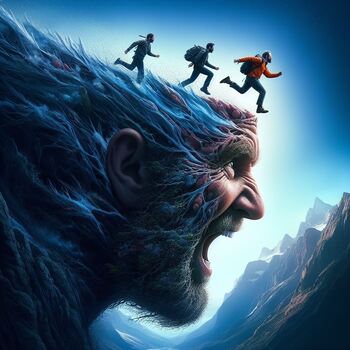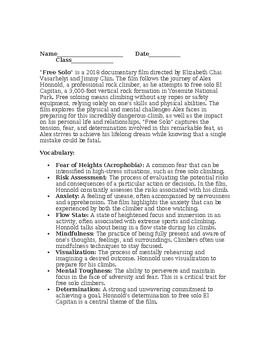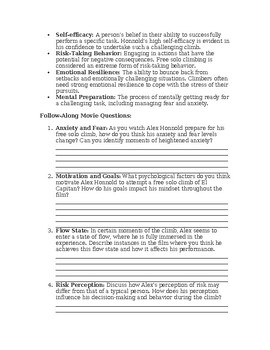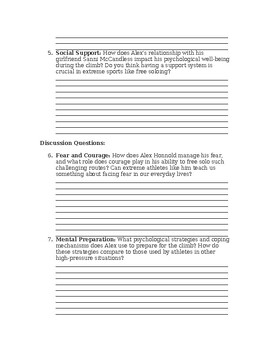Free Solo (2018) Psychology Class: Documentary Viewing Guide with KEY
DrHale's Social Science Survival Store
155 Followers
Grade Levels
6th - 12th, Higher Education, Adult Education, Homeschool
Subjects
Resource Type
Formats Included
- Word Document File
Pages
7 pages
DrHale's Social Science Survival Store
155 Followers
Also included in
- Teaching Summer School Psychology Resource BUNDLEMovies Viewing GuidesDocumentary Viewing GuidesLessonsProjectsActivitiesOver 175 Resources! Summer School Psych!!!!Price $750.00Original Price $939.00Save $189.00
Description
Using "Free Solo" (2018) in a high school psychology class can provide valuable insights into various psychological concepts and principles. Here's a rationale for its use:
- Risk-taking Behavior: The film follows rock climber Alex Honnold as he attempts to free solo climb El Capitan, a daunting 3,000-foot vertical rock face in Yosemite National Park without ropes or safety equipment. This extreme form of risk-taking behavior can serve as a case study for discussing the psychological factors that drive individuals to engage in high-risk activities.
- Fear and Anxiety: Alex Honnold's free solo climb elicits intense fear and anxiety, both for himself and for the viewers. Analyzing the psychological mechanisms behind fear and anxiety can help students understand the role of these emotions in decision-making and performance under pressure.
- Motivation and Goal Setting: Alex Honnold's unwavering determination to achieve his goal of free soloing El Capitan provides an opportunity to explore motivation and goal-setting theory. Students can examine how Honnold's passion, persistence, and commitment drive his actions and decision-making processes.
- Flow State and Peak Performance: The film captures moments of Honnold experiencing a flow state, a state of optimal performance characterized by intense focus and immersion in the activity. By studying Honnold's ability to achieve peak performance under extreme conditions, students can learn about the psychological factors that contribute to flow states and peak performance in various contexts.
- Personality Traits: Analyzing Alex Honnold's personality traits can offer insights into the characteristics associated with successful risk-takers and extreme athletes. Students can explore concepts such as sensation seeking, sensation avoidance, risk perception, and sensation seeking scales.
- Mental Health and Coping Mechanisms: The film provides glimpses into Honnold's mental health and coping mechanisms, including his strategies for managing fear and anxiety. This can spark discussions about mental health awareness, stress management techniques, and the importance of seeking support when facing challenges.
- Ethical Considerations: "Free Solo" raises ethical questions about the pursuit of extreme sports and the responsibilities of individuals and organizations involved in supporting such endeavors. Exploring these ethical dilemmas can encourage critical thinking and ethical reasoning skills among students.
Overall, "Free Solo" offers a captivating and thought-provoking exploration of human psychology, resilience, and the pursuit of extraordinary goals, making it a valuable resource for stimulating discussions and deeper reflections in a high school psychology class.
Free Solo (2018) Psychology Class: Documentary Viewing Guide with KEY
Total Pages
7 pages
Answer Key
Included
Teaching Duration
3 hours
Report this resource to TPT
Reported resources will be reviewed by our team. Report this resource to let us know if this resource violates TPT’s content guidelines.






